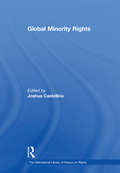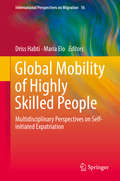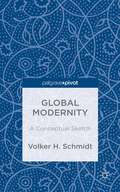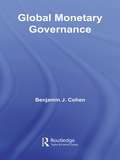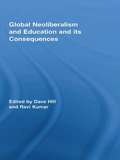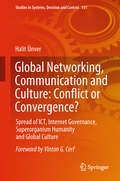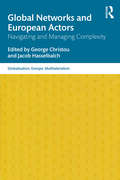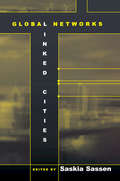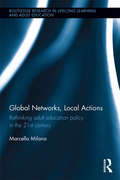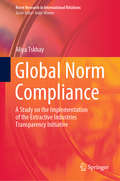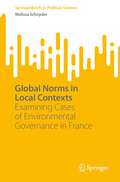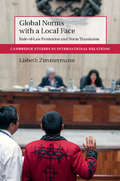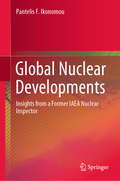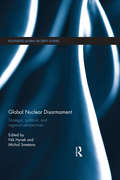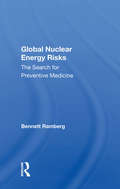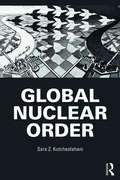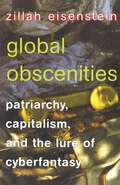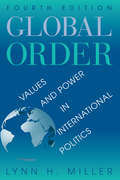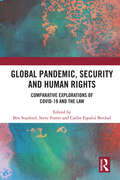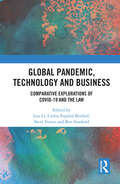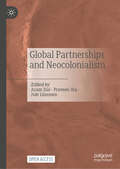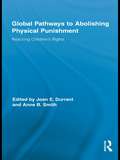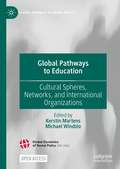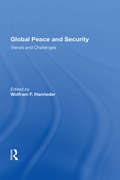- Table View
- List View
Global Minority Rights (The International Library of Essays on Rights)
by Joshua CastellinoThis important volume brings together a range of material in different areas of law and the social sciences that address questions concerning the rights of minorities. The discipline is arguably one of the oldest branches of public international law, and owes its heritage to those who struggled to create standards to protect the numerically inferior and non-dominant communities from the excesses of the majority. While reflecting this rich heritage, the works contained in this volume show the extent to which policy constructs (especially in law) have begun to pay heed to the need to include minorities in different domestic settings across the globe. To provide readers with a structured approach to understanding global minority rights law the editor divides the issues into six main headings, namely: Historical Development; Conceptual Development; Contemporary Challenges; Fundamental Norms of Minority Protection; Specific Rights of Minorities; Human Rights and Minority Rights.
Global Mobility of Highly Skilled People: Multidisciplinary Perspectives on Self-initiated Expatriation (International Perspectives on Migration #16)
by Maria Elo Driss HabtiThis volume examines self-initiated expatriates (SIEs), the category of highly skilled people whose movement from one country to another is by choice. Although they are not forced to relocate due to work, conflict or natural disaster, their migration pattern is every bit as complex. The book challenges previous theoretical approaches that take for granted a more simplistic view of this population, and advances that mobility of SIEs relates to the expatriates themselves, their conditions and the different structures intervening in their career life course. With their visible increase worldwide, this book positions itself as a nexus for this on-going discussion, while linking self-initiated expatriation to the theoretical landscape of international skilled migration and mobility. Major interests that catch attention are transnational practices, work-related experiences and personal life course, including forms of inequalities in their migration experiences. The book identifies forms and drivers of migratory behaviour and provides an argument concerning the broader processes of mobility and integration. As such, this book constitutes a departure point for future research in terms of theoretical underpinnings and empirical rigor on global highly skilled mobility of SIEs. The collection of empirical case studies offers an insightful analysis for policy makers, concerned stakeholders and organizations to better cope with this form of migration.
Global Modernity. A Conceptual Sketch
by Volker H. SchmidtThis book introduces the concept of global modernity as a paradigm for the analysis of the contemporary era. Building on Parson's distinction between social, cultural, personal and organismic systems, it presents a four-dimensional scheme that aims to identify modernity's key structural components.
Global Monetary Governance
by Benjamin J. CohenBenjamin J. Cohen has been one of the most original and influential writers on international political economy. This book provides an overview of his contribution to the field, grouped around the central theme of global monetary governance. The book is divided into three sections:challenges to systemic governance - examines the challenge of governa
Global Monitoring Report 2011: Improving the Odds of Achieving the MDGs
by International Monetary FundThe report shares what has been done towards meeting the Millenium Development Goals, and how lessons from successes and failures might be applied during the remaining five years of the program to improve chances of accomplishment. The perspectives are the diversity of progress, economic growth in developing countries, linking spending and outcomes in education and health, assisting the indigenous and socially excluded, and progress in the international development and trading framework. There is no index. Annotation ©2011 Book News, Inc. , Portland, OR (booknews. com)
Global Neoliberalism and Education and its Consequences (Routledge Studies in Education, Neoliberalism, and Marxism)
by Dave Hill Ravi KumarIn this groundbreaking critique of neoliberalism in schooling and education, an international cast of education policy analysts, educational activists and scholars deftly analyze the ideologies underlying the global, national and local neoliberalisation of schooling and education. The thrilling scholarship that makes up Global Neoliberalism and Education and its Consequences exposes the machinations, agenda and impacts of the privatising and 'merchandisation' of education by the World Bank, the General Agreement on Trade in Services (GATS), biased think tanks, global and national corporations and capital, and the full political spectrum of Neoliberal governments. Including such topics as the increasing polarization of racialized and gendered social classes as a consequence of neoliberal policies, the role and shape of markets and education in the era of globalised Capitalism, the effects of the profit motive in higher education, the impact of the Heritage Foundation in the USA, and even a critical evaluation of education in Cuba--readers are sure to find startling insight and provocative arguments throughout Global Neoliberalism and Education and its Consequences.
Global Networking, Communication and Culture: Conflict or Convergence?
by Halit ÜnverPursuing an interdisciplinary approach, this book offers detailed insights into the empirical relationships between overall social key figures of states and cultures in the fields of information and communication technology (ICT) (digital divide/inequality), the economy, education and religion. Its goal is to bridge the ‘cultural gap’ between computer scientists, engineers, economists, social and political scientists by providing a mutual understanding of the essential challenges posed and opportunities offered by a global information and knowledge society. In a sense, the historically unprecedented technical advances in the field of ICT are shaping humanity at different levels and forming a hybrid (intelligent) human-technology system, a so-called global superorganism. The main innovation is the combined study of digitization and globalization in the context of growing social inequalities, collapse, and sustainable development, and how a convergence towards a kind of global culture could take place. Accordingly, the book discusses the spread of ICT, Internet Governance, the balance between the central concentration of power and the extent of decentralized power distribution, the inclusion or exclusion of people and states in global communication processes, and the capacity for global empathy or culture.
Global Networks and European Actors: Navigating and Managing Complexity (Globalisation, Europe, and Multilateralism)
by George Christou and Jacob HasselbalchThis book examines the ability of the EU and European actor networks to coherently and effectively navigate, manage, and influence debates and policy on the international stage. It also questions whether increasing complexity across a range of critical global issues and networks has affected this ability. Engaging with the growing theoretical and conceptual literature on networks and complexity, the book provides a deeper understanding of how the European Union and European actors navigate within global networks and complex regimes across a range of regulatory, policy cooperation, and foreign and security policy issue areas. It sheds light on how far they are able to respond to and shape solutions to some of the most pressing challenges on the global agenda in the 21st century. This book will be of key interest to scholars and students of EU/European and global networks and more broadly to European and EU studies, Global Governance, International Relations, International Political Economy, and Foreign Policy and Security Studies.
Global Networks, Linked Cities
by Saskia SassenIn her pioneering book The Global City, Saskia Sassen argued that certain cities in the postindustrial world have become central nodes in the new service economy, strategic sites for the acceleration of capital and information flows as well as spaces of increasing socio-economic polarization. One effect has been that such cities have gained in importance and power relative to nation-states. In this new collection of essays, Sassen and a distinguished group of contributors expand on the author's earlier work in a number of important ways, focusing on two key issues. First, they look at how information flows have bound global cities together in networks, creating a global city web whose constituent cities become global through the networks they participate in. Second, they investigate emerging global cities in the developing world-Sao Paulo, Shanghai, Hong Kong, Mexico City, Beirut, the Dubai-Iran corridor, and Buenos Aires. They show how these globalizing zones are not only replicating many features of the top tier of global cities, but are also generating new socio-economic patterns as well. These new patterns of development promise to lead to significant changes in the structure of the global economy, as more and more cities worldwide are integrated into globalization's circuitry. Includes contributions from:Linda Garcia, Patrice Riemens, Geert Lovink, Peter Taylor, David Smith, Michael Timberlake, Stephen Graham, Sueli Schiffer Ramos, Christoff Parnreiter, Felicity Gu, David Meyer, Pablo Ciccolella, Iliana Mignaqui, Eric Huybrechts, Ali Parsa. Also includes six maps.
Global Networks, Local Actions: Rethinking adult education policy in the 21st century (Routledge Research in Lifelong Learning and Adult Education)
by Marcella MilanaGlobal Networks, Local Actions: Rethinking adult education policy in the 21st century examines public policy developments in adult education, exploring the policy framing of adult education practice in a range of socio-cultural contexts, and contributing to the development of policy research from global and comparative perspectives. Drawing from multidisciplinary fields such as adult education, comparative and international education, and sociology, chapters analyse empirically grounded studies from the US, Italy, Argentina and Brazil. Each study helps to identify how political agents interact at international, regional, national and local scales, and what the implications are for publically-funded interventions in adult education. While this book recognises the complexity of adult education policy, it argues for the need to deconstruct the false belief that what is global in adult education may be intrinsically distinct from the characteristics of geographical or social territories in which adult education occurs. Instead, it points to localised norms and ideas on Adult Basic and Secondary Education as ultimately contained in, and constituting, what is at times perceived as global, or abstracted from definite geographical or social territories. This book calls for a global sociology of adult education in response to global challenges, and makes an important contribution to our understanding of developments in public adult education policy. As such, it will be of key interest to researchers, academics and postgraduate students in the fields of adult education, comparative and international education, education policy and politics, sociology of education, and global studies.
Global Norm Compliance: A Study on the Implementation of the Extractive Industries Transparency Initiative (Norm Research in International Relations)
by Aliya TskhayThis book examines the implementation of, the spread of, and compliance with emerging global norms. Based on empirical country studies on the implementation of transparency norms defined by the Extractive Industries Transparency Initiative (EITI) – a multi-stakeholder process seeking to promote global standards for the transparent and accountable management of oil, gas and mineral resources –, it investigates the various factors and motivations affecting actors with regard to norm compliance. The book demonstrates that compliance with global norms depends on a combination of various factors, including motivations and conditions for introducing norms into the domestic political space; local actors’ level of commitment to the norm; and their capacity for norm compliance. Given its scope, the book will appeal to all international relations scholars interested in processes of norm localisation, compliance, and contestation.
Global Norms in Local Contexts: Examining Cases of Environmental Governance in France (SpringerBriefs in Political Science)
by Melissa SchnyderThis Brief discusses the translation of global environmental norms across local contexts in France. It provides a snapshot of how global-level environmental norms travel vertically across levels of governance, from the global to the local, and asks how global environmental norms are (re)interpreted by local-level actors and translated to a particular local context. Chapters focus on three in-depth case studies, each involving multi-stakeholder environmental governance: (1) the Cerbère-Banyuls Marine Nature Reserve, (2) the Thau Fisheries Local Action Group (FLAG), and (3) the Biovallée biodistrict. In each of these cases, the author assesses how twilight norms are used to frame, promote, and generally develop a local discourse that centers on environmental conservation and sustainability. By combining concepts from the literature on norm localization with processes from the literature on norm-based institutional change, this Brief will generate new insights on the dynamic aspects of norm translation. As such, it will be of interest to researchers studying environmental politics, comparative policy, governance, and norms.
Global Norms with a Local Face: Rule-of-Law Promotion and Norm Translation (Cambridge Studies in International Relations)
by Lisbeth ZimmermannTo what extent are global rule-of-law norms, which external actors promote in post-conflict states, localized? Who decides whether global standards or local particularities prevail? This book offers a new approach to the debate about how the dilemma between the diffusion of global norms and their localization is dealt with in global politics. Studying the promotion of children’s rights, access to public information and an international commission against impunity in Guatemala, Lisbeth Zimmermann demonstrates that rule-of-law promotion triggers domestic contestation, and thereby changes the approach taken by external actors and ultimately the manner in which global norms are translated. However, the leeway in local translation is determined by the precision of global norms. Based on an innovative theoretical approach and in-depth study of rule-of-law translation, she argues for a shift in norm promotion from context sensitivity to democratic appropriation, speaking to international relations, peacebuilding, democratization studies, international law and political theory.
Global Nuclear Developments: Insights from a Former IAEA Nuclear Inspector
by Pantelis F. IkonomouWritten by a former International Atomic Energy Agency (IAEA) nuclear inspector and nuclear security expert, this book provides a comprehensive and authentic overview of current global nuclear developments. The author provides detailed insights into current and past nuclear crises and reveals the technical capabilities, political strategies and motives of nuclear weapon owners. By analyzing the nuclear programs and strategies of various countries, including the USA, Russia, China, Great Britain and France, this book highlights the existing global nuclear threat and the risks it entails for humanity. It also describes the current blockades and suggests possible ways out. Given its scope, the book will appeal to scholars and policymakers interested in gaining new insights into sensitive or complex nuclear programs in various countries.
Global Nuclear Disarmament: Strategic, Political, and Regional Perspectives (Routledge Global Security Studies)
by Nik Hynek Michal SmetanaThis book examines the issue of nuclear disarmament in different strategic, political, and regional contexts. This volume seeks to provide a rich theoretical and practical insight to one of the major topics in the field of international security: global abolishment of nuclear weapons. Renewed calls for a nuclear weapons-free world have sparked a wide academic debate on both the attainability of such goal and the steps that should be taken. Comparably less attention, however, has been paid to theoretically informed considerations of the consequences of nuclear abolition. Comprising essays from leading scholars and experts within the field, this collection discusses the fundamental theoretical and conceptual foundations of nuclear disarmament and subsequently tries to assess its hypothetical impact in global and regional contexts. The varied methodological approach of the contributors aims to advance a multi-theoretical and multi-perspectival view of the issue. The book is organized in three main sections: ‘Strategic Perspectives’, dealing with the specific constraints and facilitators for the states to achieve their core objectives; ‘Political Perspectives’, with the focus on the power of norms, belief-systems and ideas; and ‘Regional Perspectives’, with the analyses of seven regional and/or state-specific nuclear contexts. As a whole, the volume provides a detailed, complex overview of the risks and opportunities that are embedded in the vision of a nuclear weapon-free world. This book will be of great interest to students of nuclear proliferation, arms control, war and conflict studies, international relations and security studies.
Global Nuclear Energy Risks: The Search For Preventive Medicine
by Bennett RambergThis book addresses the strategic challenges and proposes alternative international remedies set in historical and regulatory contexts that suggest that nations should increase international scrutiny of atomic power in order to minimize risks. .
Global Nuclear Order (Routledge Global Security Studies)
by Sara Z. KutchesfahaniThis book examines the importance of global nuclear order, emphasising the importance of perspective in our understanding of it, and its significance in international politics. Addressing a gap in existing literature, this book provides an introduction to nuclear weapon states and their relationship with the global nuclear order/disorder paradigm. It explores four main themes and aims to: 1. conceptualise the dichotomous paradigm of global nuclear order/disorder; 2. outline the different phases of global nuclear order/disorder from 1945 to present; 3. address the Nuclear Non-Proliferation Treaty (NPT) and the wider international nuclear non-proliferation regime; 4. provide an overview of every nuclear weapon state’s national nuclear doctrines throughout the years. The book will be of much interest to students of nuclear proliferation, global governance, security studies, Cold War studies, foreign policy and IR, more generally.
Global Obscenities: Patriarchy, Capitalism, and the Lure of Cyberfantasy
by Zillah EisensteinThe New York Times devotes the cover of its magazine to America's declining interest in politics and its obsession with money, finance, and the markets. Bill Gates builds a $50 million mansion while food pantries and homeless shelters overflow with the desperate. The explosive expansion of media and cyber conglomerates creates dreamworlds while the ecology of our actual world is jeopardized. Public space and public democracy withers, as is evidenced by the fact that the closest facsimile of a town square is the local Barnes and Noble. New geographies of power are defined by sex scandals, plant closings, cyberporn, sweatshop labor, information webs, and stock market schizophrenia. Global capitalism and its cyberrelations use this chaos to construct modern forms of sexual and racial exploitation. Into this world steps Zillah Eisenstein, with a book of profound despair and yet also great hope, informed by her trademark sharp analysis and her unrelenting passion for a more humane world. Exposing the purported democratic effect of new media for the global mirage it is, Eisenstein shows how transnational capital and its patriarchal obsessions threaten us all, while at the same time creating possibilities for a new democratic society.
Global Order: Values And Power In International Relations, Fourth Edition
by Lynn H MillerA survey of international relations, this benchmark text explains concepts of global order from the Westphalian system to current issues in international relations. In this latest edition, Lynn Miller covers new developments in ethnic violence, economic development, human rights, intervention, and environmental issues and discusses the potential developments and choices in the post?Cold War era, posing alternative ?new world order? scenarios that emphasize improving the world's ability to engage in peacekeeping in light of the Gulf War and other recent conflicts. The text advocates critical world-order values and proposes means for minimizing violence, maximizing economic well-being, enhancing human rights, and protecting the environment.
Global Pandemic, Security and Human Rights: Comparative Explorations of COVID-19 and the Law
by Steve Foster Carlos Espaliú Berdud Ben StanfordThis book presents an international and comparative exploration of how the COVID-19 global pandemic has affected and impacted on issues of human rights, security and law. Throughout the world the COVID-19 global pandemic has fundamentally impacted and altered our way of life. As this book sets out, all states have had to contend with similar challenges as well as competing interests and obligations affecting human rights and security. These challenges present very few simple choices but nonetheless carry enormous consequences. Organised into two thematic and distinct, yet interrelated parts, first on theoretical and practical challenges for human rights and second on threats to personal, collective and global security, the book examines how the ability of states to safeguard our fundamental rights and security, broadly defined, has been challenged and that questions about the legality and legal impact of recent responses to COVID-19 will persist for some time. It is often said that global problems require coordinated global solutions, but the various responses to the pandemic by states suggest a notable lack of a consensus amongst the international community. The book will be of interest to academics and researchers working in the areas of human rights law and security law. It will also appeal to constitutional lawyers, given the nature of law-making and the challenge of ensuring adequate scrutiny in emergency situations as well as the impact of COVID-19 upon the legal framework more generally. It will provide a valuable resource for policymakers, practitioners, and public servants.
Global Pandemic, Technology and Business: Comparative Explorations of COVID-19 and the Law
by Luo Li Steve Foster Carlos Espaliú Berdud Ben StanfordThis book presents an exploration of a wide range of issues in law, regulation and legal rights in the sectors of information protection, the creative economy and business activities following COVID-19. The debilitative effect of the global pandemic on information protection and creative and business activities is powerful, widespread and deeply influential, bringing a range of uncertainties to these sectors. The effects of the crisis challenge the fundamentals of the legal systems of most countries in their attempt to govern them. Written by international academics from a diversified background of law disciplines and legal systems, this book offers a global vision in exploring the wide range of legal issues caused by the COVID-19 crisis in these fields. The book is organised into three clear thematic parts: Part I looks at information protection and intellectual property rights and strategies; Part II examines contracts, cooperation and mediation in the post-COVID-19 market arena; and Part III discusses issues pertaining to corporate governance and employment rights. The book explores the unprecedented challenges posed by the pandemic crisis from a global perspective. It will provide invaluable information and guidance in this area to those in the fields of law, politics, and economics whose interests are related to information, business and the creative industry, as well as providing indispensable reading to business practitioners and public servants.
Global Partnerships and Neocolonialism
by Praveen Jha Aram Ziai Jule LümmenThis open access book points at some of the problematic aspects of international partnerships that continue to be shaped by colonialism. A &“global partnership for sustainable development&” is the 17th of the Sustainable Development Goals (SDGs). However, research points to shortcomings and problematic aspects of international partnerships that have been shaped by colonialism and continue to reflect unequal power relations between the global North and South. Hence, the chapters of this edited volume explore how global partnerships can be established in a neocolonial environment in the fields of development cooperation, the global economy and knowledge production. The contributions were written by members of the Global Partnership Network (GPN), one of the Centres of Excellence for Exchange and Development funded by the German Ministry for Development Cooperation, which has been working intensively and critically on the topic of partnerships and North-South relations over the past four years.
Global Pathways to Abolishing Physical Punishment: Realizing Children’s Rights (Routledge Research in Education)
by Anne B. Smith Joan E. DurrantThis book describes the unfolding of a global phenomenon: the legal prohibition of physical punishment of children. Until thirty years ago, this near-universal practice was considered appropriate, necessary and a parental right. But a paradigm shift in conceptions of childhood has led to a global movement to redefine it as violence and as a violation of children’s rights. Today, many countries have prohibited it in all settings, including the home. This remarkable shift reflects profound cultural changes in thinking about children and their development, parent-child relationships, and the role of the state in family life. It has involved actors in many sectors, including academia, government, non-governmental organizations and children themselves. Documenting the stories of countries that have either prohibited corporal punishment of children or who are moving in that direction, this volume will serve as a sourcebook for scholars and advocates around the world who are interested in the many dimensions of physical punishment and its elimination.
Global Pathways to Education: Cultural Spheres, Networks, and International Organizations (Global Dynamics of Social Policy)
by Kerstin Martens Michael WindzioIn this open access volume, the editors identify the trajectories and patterns displayed by education systems and investigate the causes of change from a global and historical perspective. The contributors argue that the emergence and development of education systems can be traced back to inherent national factors, as well as to the international diffusion of ideas.The research presented in this volume is a wide-ranging analysis and explanation of the dynamics of emergence, diffusion, and change in relation to state education systems. The chapters offer an empirical investigation into whether the global diffusion of Western-rational educational content and organizational forms occurs as expected by neoinstitutionalist theory, or whether culturally specific developmental paths dominate in different parts of the world.The book will be of interest to students and researchers in various social science disciplines, including social policy, education, sociology, political science, international relations, organizational theory, and economics.
Global Peace And Security: Trends And Challenges
by Wolfram F HanriederFocusing on the social, economic, and political structures of the postwar global order, this collection of essays discusses the search for a new international economic order, the transformation of the nation-state and the international balance of power, the technological and strategic dimensions of the nuclear age, East-West trade and technology tr
